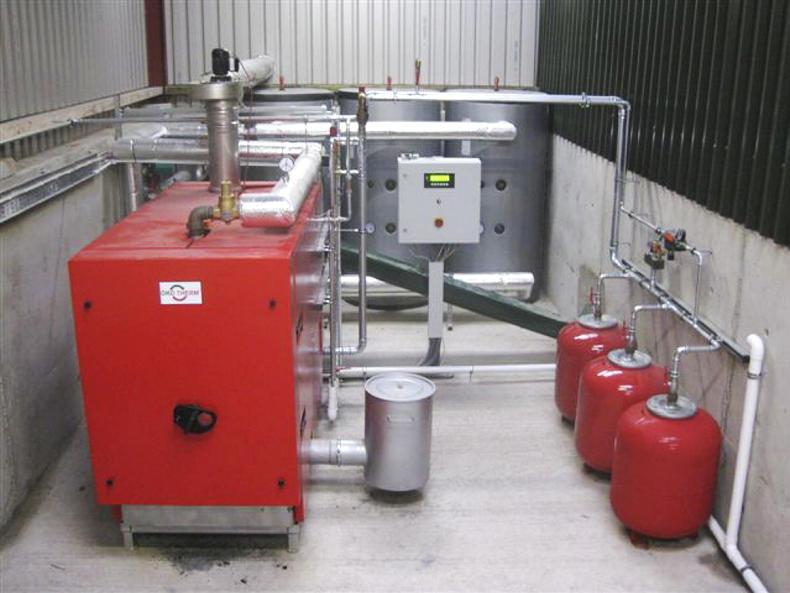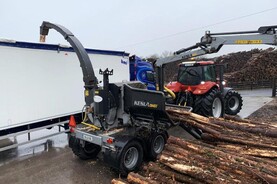Annual payments to farmers as part of a new renewable heat scheme in the Republic of Ireland will be over five times that paid to NI farmers under the current Renewable Heat Incentive (RHI).
The Irish government’s Support Scheme for Renewable Heat (SSRH) was approved by the European Commission on Monday and for a standard poultry shed with an annual heating requirement of 400,000kWhr, a 199kW biomass boiler could deliver a total annual payment of €20,000 (£17,342).
It will leave NI hugely uncompetitive for poultry and mushrooms compared with producers in the south. We have the same costs for boilers and wood pellets
Under the current RHI tariff structure in NI, the maximum annual payment that a 199kW boiler can deliver is £3,138. Most RHI participants in NI have 99kW boilers and RHI payments are currently limited to £2,210/year.
“It will leave NI hugely uncompetitive for poultry and mushrooms compared with producers in the south. We have the same costs for boilers and wood pellets,” one local poultry producer told the Irish Farmers Journal.
Different calculations were used in RHI and SSRH to establish the costs associated with biomass boilers. Greater allowances were given in the Irish scheme for the capital cost of installing biomass boilers, as well as running and servicing costs, which subsequently led to higher tariff rates.
“The whole formula is different, so obviously they have come up with completely different numbers,” said Renewable Heat Association executive chair Andrew Trimble.
Inquiry
Meanwhile, Justin Coleman from Moy Park will be the first witness questioned by MPs as part of the NI Affairs Committee’s inquiry into RHI tariff cuts. The committee is to begin hearing evidence in Westminster next Wednesday.
The proposal was crucial to getting legislation for recent RHI tariff cuts through parliament in March
As well as an inquiry into RHI tariff cuts, the UK government proposed setting up an independent unit within the Department for the Economy (DfE) to examine cases of financial hardship among RHI claimants in NI.
The proposal was crucial to getting legislation for recent RHI tariff cuts through parliament in March.
However, sources indicate there has been no movement within DfE to get the unit established. DfE declined to comment when approached by the Irish Farmers Journal this week.
Read more
RHI cuts pass through Westminister
Poultry farmers face rising debt
Annual payments to farmers as part of a new renewable heat scheme in the Republic of Ireland will be over five times that paid to NI farmers under the current Renewable Heat Incentive (RHI).
The Irish government’s Support Scheme for Renewable Heat (SSRH) was approved by the European Commission on Monday and for a standard poultry shed with an annual heating requirement of 400,000kWhr, a 199kW biomass boiler could deliver a total annual payment of €20,000 (£17,342).
It will leave NI hugely uncompetitive for poultry and mushrooms compared with producers in the south. We have the same costs for boilers and wood pellets
Under the current RHI tariff structure in NI, the maximum annual payment that a 199kW boiler can deliver is £3,138. Most RHI participants in NI have 99kW boilers and RHI payments are currently limited to £2,210/year.
“It will leave NI hugely uncompetitive for poultry and mushrooms compared with producers in the south. We have the same costs for boilers and wood pellets,” one local poultry producer told the Irish Farmers Journal.
Different calculations were used in RHI and SSRH to establish the costs associated with biomass boilers. Greater allowances were given in the Irish scheme for the capital cost of installing biomass boilers, as well as running and servicing costs, which subsequently led to higher tariff rates.
“The whole formula is different, so obviously they have come up with completely different numbers,” said Renewable Heat Association executive chair Andrew Trimble.
Inquiry
Meanwhile, Justin Coleman from Moy Park will be the first witness questioned by MPs as part of the NI Affairs Committee’s inquiry into RHI tariff cuts. The committee is to begin hearing evidence in Westminster next Wednesday.
The proposal was crucial to getting legislation for recent RHI tariff cuts through parliament in March
As well as an inquiry into RHI tariff cuts, the UK government proposed setting up an independent unit within the Department for the Economy (DfE) to examine cases of financial hardship among RHI claimants in NI.
The proposal was crucial to getting legislation for recent RHI tariff cuts through parliament in March.
However, sources indicate there has been no movement within DfE to get the unit established. DfE declined to comment when approached by the Irish Farmers Journal this week.
Read more
RHI cuts pass through Westminister
Poultry farmers face rising debt






 This is a subscriber-only article
This is a subscriber-only article










SHARING OPTIONS: